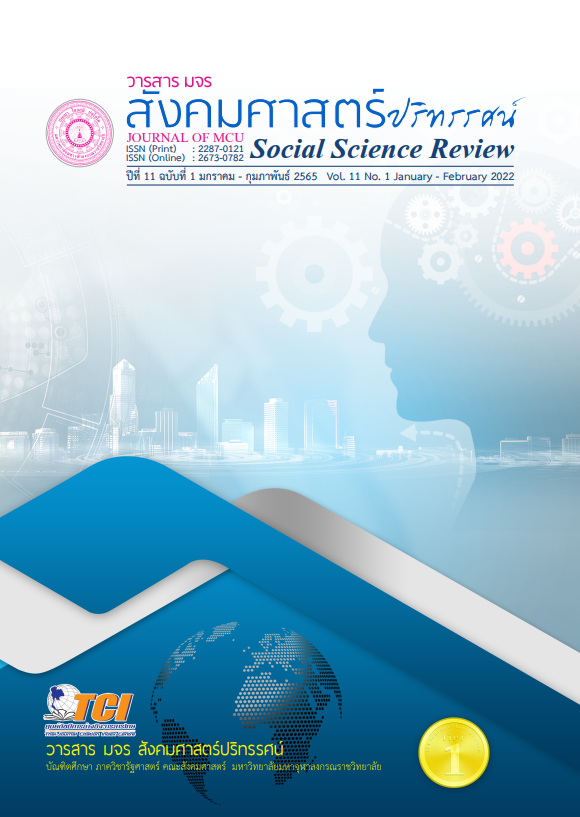รูปแบบการบริหารจัดการการท่องเที่ยวเชิงวัฒนธรรม ของวัดในจังหวัดราชบุรี
คำสำคัญ:
การบริหารจัดการ, การท่องเที่ยวเชิงวัฒนธรรม, จังหวัดราชบุรีบทคัดย่อ
บทความวิจัยนี้มีวัตถุประสงค์เพื่อศึกษาสภาพทั่วไป กระบวนการและนำเสนอรูปแบบ เป็นวิจัยเชิงคุณภาพ เก็บข้อมูลภาคสนามโดยในการสัมภาษณ์เชิงลึกผู้ให้ข้อมูลสำคัญ จำนวน 25 รูปหรือคน ได้ใช้แบบสัมภาษณ์แบบมีโครงสร้าง ที่มีค่าดัชนีวัดความเที่ยงตรงเชิงเนื้อหาทั้งฉบับ (S-CVI) เท่ากับ 1.00 เป็นเครื่องมือในการเก็บรวบรวมข้อมูล โดยวิเคราะห์ข้อมูลด้วยเทคนิคการวิเคราะห์เนื้อหาประกอบบริบท และการสนทนากลุ่มเฉพาะผู้ทรงคุณวุฒิ จำนวน 12 รูปหรือคน โดยวิเคราะห์ข้อมูลด้วยเทคนิคการวิเคราะห์เนื้อหาประกอบบริบท
ผลการวิจัยพบว่า 1. วัดมีต้นทุนทางเอกลักษณ์วัฒนธรรมท้องถิ่นของชุมชนที่เข้มแข็งและเด่นชัด แต่พระสงฆ์บางรูปยังขาดความรู้ที่จำเป็นสำหรับการบริหารจัดการการท่องเที่ยวเชิงวัฒนธรรม 2. กระบวนการบริหารจัดการ ได้แก่ การจัดทำแผนโดยเน้นการมีส่วนร่วม การกำหนดบทบาทหน้าที่ประจำในแต่ละตำแหน่งงานภายในวัดให้ชัดเจน การสร้างอาชีพและสร้างความสัมพันธ์ที่ดีกับประชาชน การหลีกเลี่ยงความขัดแย้งที่อาจเกิดขึ้นในทุกกรณี การหมั่นตรวจตราการปฏิบัติงานตามแผนงานที่ได้วางไว้ เป็นต้น 3. รูปแบบการบริหารจัดการ ได้แก่ การใช้มรดกทางวัฒนธรรมท้องถิ่นหรือวัฒนธรรมที่เป็นวัตถุมาเป็นสิ่งดึงดูดนักท่องเที่ยว การนำเทคโนโลยีเข้ามาช่วยในการเดินทางโดยจัดเป็นแผนที่เส้นทางการเดินรถไว้ในเว็บแพจของวัด การอำนวยความสะดวกโดยจัดให้มีร้านค้าอาหาร เครื่องดื่ม และของที่ระลึก การจัดให้มีระบบบริการข้อมูลการท่องเที่ยวของวัด เป็นต้น
เอกสารอ้างอิง
กอปรลาภ อภัยภักดิ์. (2564). การพัฒนาทรัพยากรมนุษย์ตามหลักสังคหวัตถุ 4. วารสารสหวิทยาการนวัตกรรมปริทรรศน์, 4(1), 80-87.
กัลยรัศมิ์ ทิณรัตน์และคณะ. (2557). แนวทางการพัฒนาการท่องเที่ยวเชิงวัฒนธรรมอย่างยั่งยืน: กรณีศึกษาบ้านโคกก่องตำบลกุดหว้า อำเภอกุฉินารายณ์ จังหวัดกาฬสินธุ์ (รายงานการวิจัย). กาญจนบุรี: มหาวิทยาลัยเทคโนโลยีราชมงคลอีสาน วิทยาเขตกาญจนบุรี.
จริยา มหายศนันทน์. (2558). การพัฒนาบทบาทและหน้าที่ในการบริหารงานองค์กรปกครองส่วนท้องถิ่น (วิทยานิพนธ์พุทธศาสตรดุษฎีบัณฑิต สาขาวิชารัฐประศาสนศาสตร์). พระนครศรีอยุธยา: มหาวิทยาลัยมหาจุฬาลงกรณราชวิทยาลัย.
จามร ช้างมงคล. (2564). ความพึงพอใจของประชาชนต่อการจัดการงานสาธารณูปการของวัดเวฬุวนาราม อำเภอดำเนินสะดวก จังหวัดราชบุรี. วารสารพุทธนวัตกรรมและการจัดการ, 4(1), 10-19.
จำนงค์ อดิวัฒนสิทธิ์ และคณะ. (2548). สังคมวิทยา (พิมพ์ครั้งที่ 12). กรุงเทพฯ: มหาวิทยาลัย เกษตรศาสตร์.
ณรงค์ จันทรัศมี. (2558). การพัฒนาการบริหารจัดการกิจการสาธารณะด้วยหลักพุทธธรรมของผู้บริหารองค์กรปกครองส่วนท้องถิ่นในเขตจังหวัดพระนครศรีอยุธยา (วิทยานิพนธ์พุทธศาสตรดุษฎีบัณฑิต สาขาวิชารัฐประศาสนศาสตร์). พระนครศรีอยุธยา: มหาวิทยาลัยมหาจุฬาลงกรณราชวิทยาลัย.
บุณรดา กรรณสูต. (2558). การประยุกต์รูปแบบการบริหารเชิงพุทธของสถานศึกษาขั้นพื้นฐานในจังหวัดนนทบุรี (วิทยานิพนธ์พุทธศาสตรดุษฎีบัณฑิต สาขาวิชารัฐประศาสนศาสตร์). พระนครศรีอยุธยา: มหาวิทยาลัยมหาจุฬาลงกรณราชวิทยาลัย.
พรศิริ วิรุณพันธ์. (2551). การศึกษากระบวนการมีส่วนร่วมของผู้นำท้องถิ่นต่อการท่องเที่ยวเชิงวัฒนธรรม กรณีศึกษา : วัดพระธาตุเรืองรอง (รายงานการวิจัย). ศรีสะเกษ: มหาวิทยาลัยราชภัฏศรีสะเกษ.
พระครูสมุห์วัลลภ ฐิตสํวโร. (2558). การบริหารจัดการด้านสาธารณูปการตามหลักพุทธธรรมของคณะสงฆ์จังหวัดเชียงใหม่ (วิทยานิพนธ์พุทธศาสตรดุษฎีบัณฑิต สาขาวิชารัฐประศาสนศาสตร์). พระนครศรีอยุธยา: มหาวิทยาลัยมหาจุฬาลงกรณราชวิทยาลัย.
พระมหาสมชาย สุขาวหโน. (2558). การพัฒนาการบริหารจัดการโครงการบรรพชาสามเณรภาคฤดูร้อนในเขตการปกครองคณะสงฆ์ภาค 9 (วิทยานิพนธ์พุทธศาสตรดุษฎีบัณฑิต สาขาวิชารัฐประศาสนศาสตร์). พระนครศรีอยุธยา: มหาวิทยาลัยมหาจุฬาลงกรณราชวิทยาลัย.
รัศมี อ่อนปรีดา. (2558). การพัฒนาการท่องเที่ยวอย่างยั่งยืนของจังหวัดราชบุรี และสมุทรสงคราม (วิทยานิพนธ์รัฐประศาสนศาสตรดุษฎีบัณฑิต สาขาวิชารัฐประศาสนศาสตร์). ปทุมธานี: มหาวิทยาลัยราชภัฏวไลยอลงกรณ์ ในพระบรมราชูปถัมภ์.
วีระ บำรุงรักษ์. (2540). ระบบการบริหารจัดการวัฒนธรรมสำหรับสำนักโบราณคดีและพิพิธภัณฑ์สถานแห่งชาติ กรมศิลปากร. กรุงเทพฯ: ภาพพิมพ์.
สมศักดิ์ คล้ายสังข์. (2549). ยุทธศาสตร์การพัฒนาการท่องเที่ยวเชิงวัฒนธรรมย่านเยาวราช ศึกษากรณี : เทศการกินเจ (รายงานการวิจัย). กรุงเทพฯ: มหาวิทยาลัยราชภัฏสวนสุนันทา.
สามารถ จันทร์สูรย์ และประทีป อินแสง. (2541). การศึกษากับศิลปวัฒนธรรมและภูมิปัญญาไทย. กรุงเทพฯ: สำนักงานคณะกรรมการการศึกษาแห่งชาติ.
สุพัตรา สุภาพ. (2541). สังคมและวัฒนธรรมไทย ค่านิยม : ครอบครัว : ศาสนา : ประเพณี. กรุงเทพฯ: สำนักพิมพ์ไทยวัฒนาพานิช.
อรทัย เลิศวรรณวิทย์. (2556). แนวทางการสร้างและจัดการอัตลักษณ์สำหรับขนมไทยเพื่อส่งเสริมการท่องเที่ยวเชิงวัฒนธรรม (รายงานการวิจัย). กรุงเทพฯ: มหาวิทยาลัยราชภัฏสวนดุสิต.
อาภารัศมี บรรเจิดจรัสเลิศ. (2564). การจัดการงานสาธารณตามแนวพระพุทธศาสนา ขององค์กรการกุศลในจังหวัดราชบุรี. วารสารพุทธนวัตกรรมและการจัดการ, 4(1), 1-9.
Buhalis, D. (2000). Marketing the Competitive Destination in the Future. Tourism Management, 1(21), 97-116.
ดาวน์โหลด
เผยแพร่แล้ว
รูปแบบการอ้างอิง
ฉบับ
ประเภทบทความ
สัญญาอนุญาต
ลิขสิทธิ์ (c) 2022 วารสาร มจร สังคมศาสตร์ปริทรรศน์

อนุญาตภายใต้เงื่อนไข Creative Commons Attribution-NonCommercial-NoDerivatives 4.0 International License.
เพื่อให้เป็นไปตามกฎหมายลิขสิทธิ์ ผู้นิพนธ์ทุกท่านต้องลงลายมือชื่อในแบบฟอร์มใบมอบลิขสิทธิ์บทความให้แก่วารสารฯ พร้อมกับบทความต้นฉบับที่ได้แก้ไขครั้งสุดท้าย นอกจากนี้ ผู้นิพนธ์ทุกท่านต้องยืนยันว่าบทความต้นฉบับที่ส่งมาตีพิมพ์นั้น ได้ส่งมาตีพิมพ์เฉพาะในวารสาร มจร สังคมศาสตร์ปริทรรศน์ เพียงแห่งเดียวเท่านั้น หากมีการใช้ภาพหรือตารางหรือเนื้อหาอื่นๆ ของผู้นิพนธ์อื่นที่ปรากฏในสิ่งตีพิมพ์อื่นมาแล้ว ผู้นิพนธ์ต้องขออนุญาตเจ้าของลิขสิทธิ์ก่อน พร้อมทั้งแสดงหนังสือที่ได้รับการยินยอมต่อบรรณาธิการ ก่อนที่บทความจะได้รับการตีพิมพ์ หากไม่เป็นไปตามข้อกำหนดเบื้องต้น ทางวารสารจะถอดบทความของท่านออกโดยไม่มีข้อยกเว้นใดๆ ทั้งสิ้น





